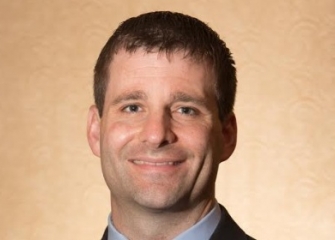
January: Time for your fiscal physical?
Especially considering the year we just snuck out of, now is a better time than ever to take some time to sit down and think about your long term plans.
If you are like most of us, there is probably more of you to love — literally, as in pounds more — and take care of now than there was this time last year. If you doubt it, check your belt loops. Or whatever gauge you use. And you are a year older and a veteran of adjusting to the new reality forced by a once-in-a-lifetime pandemic. And while there is light at the end of the tunnel in the form of new vaccines and government programs, the possibility of vaccine delays, new strains of COVID and general fatigue mean 2021 could be as tough or worse than last year. Many people who’ve put off or never thought about estate planning are rethinking things. Especially when they consider that so many people of modest means — which is what many if not most feds consider themselves — are really worth more than they thought.
According to a 2017 OPM report, the average fed was paid $85,284, with that ranging from a high of $117,788 in D.C. to $105,319 in Maryland, $94,997 in Virginia to $68,793 in Kentucky and $67,793 for the typical fed worker, then, in South Dakota. Whether that’s a lot or not for each average depends on who is doing the counting. But with “good” salaries, a good retirement program, a home-owner fed who has managed to stay married can be in relatively good shape. Someone with an estate. Worth more dead than alive. So if you have an estate, what’s in it? What’s it worth? And who controls it while you are alive but maybe not well? And what about after you’ve gone? Will your home state tax and delay distribution for months, or even years? Will people get what you want or will it be taken out of your hands? Or go to a former spouse who is still beneficiary on some of your insurance forms? How do you find out?
Start the new year right by listening to our Your Turn radio show today at 10 a.m. EST streaming here or on the radio at 1500 AM in the D.C. area. My guest is tax attorney/estate planner Tom O’Rourke, who has been advising current and former feds, and their spouses, on estate planning. Which likely means you.
The surprise is that many of us are worth more dead than alive. That’s especially true for government workers who, in addition to (so far) steady and safe jobs, have sizable 401(k) plans or money (in the form of life insurance) they can’t touch. But which will come in handy for their heirs. Many people also have homes that are paid for and worth a lot more, in most areas, than when they bought them. Now what?
Lack of control is one of the frustrating things about this already terrifying pandemic. We can spray, mask up, practice social distancing, avoid crowds, family — everybody. But then what?
The good news, if it can be called that, is there are very, very important and valuable things under your control. Things only you can deal with that will make life better for you and yours. One of the redeeming features of the COVID-19 threat is that it has forced many people to think the unthinkable.
No matter how the pandemic has impacted your life, by a little or a lot, changes in your own situation may have happened that mean you should adjust your estate accordingly. Although most feds probably consider themselves middle class, many, thanks to their retirement package, Thrift Savings Plan, life insurance and survivor benefits, actually have substantial estates.
Changes may have occurred requiring you to put the so-called “new normal” on hold and deal with your personal financial life. For example, did your daughter or son finally marry somebody who at mid-life still dreams of forming a successful heavy metal band? Did you celebrate the birth of a grandchild, or buy or sell a house? Or did you retire and move 2,000 miles away? Or are any of those life-changing events on the horizon? Short answer: Probably yes! Now what?
A lot of things have probably changed since the last time you did an estate checkup. Especially if you have never done one. Maybe you’ve been adjusting full-time. Things may have happened this year that are off your radar because you are focused on the many changes the pandemic has brought to our everyday lives.
For a sneak preview of what we’ll be talking about today, Tom has given us this checklist. He said, “Many people view their estate plan as one of life’s necessary chores. Frequently, once the plan is signed they simply file it away (hopefully they don’t lose it) and forget about it. But any estate plan should be reviewed periodically to make sure it continues to meet your needs.”
Some of the life events that make it essential that people review, and in many cases revise, their plans include:
- Birth of a child: When this happens, at a minimum, a guardian needs to be appointed for the child. It is also advisable to place any assets the child may inherit into a trust.
- You are either thinking about a divorce or you have perhaps already divorced: You need to review and change beneficiary designations, property ownership arrangements and wills, trusts, and powers of attorney.
- Your child gets married: This may or may not prompt you to revise your will or trust.
- One of your beneficiaries develops substance abuse problems or has issues with managing finances.
- The persons you have named as personal representative, trustee, or agents under a power of attorney have died, moved away, or are no longer capable of fulfilling these obligations.
- When a beneficiary such as a child faces financial challenges.
- Your minor children become responsible adults and some of the provisions in your will or trust that were designed to protect them are no longer needed.
- There has been a change in the law that affects your estate plan.
- You receive a substantial inheritance or other windfall.
- You have an estate plan— but can’t find it!
- You acquire property or move to another jurisdiction.
If any of these events happen, Tom says you need to at least have a discussion with your estate planning attorney to determine whether it is necessary to revise your plan to address these issues.
Nearly Useless Factoid
By Alazar Moges
About 3,000 droplets are expelled in a single cough, and some of them fly out of the mouth at speeds of up to 50 miles per hour.
Source: Live Science
Copyright © 2025 Federal News Network. All rights reserved. This website is not intended for users located within the European Economic Area.
Mike Causey is senior correspondent for Federal News Network and writes his daily Federal Report column on federal employees’ pay, benefits and retirement.
Follow @mcauseyWFED





